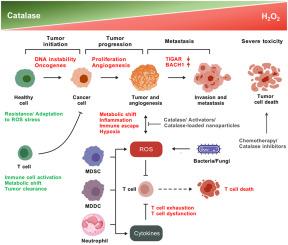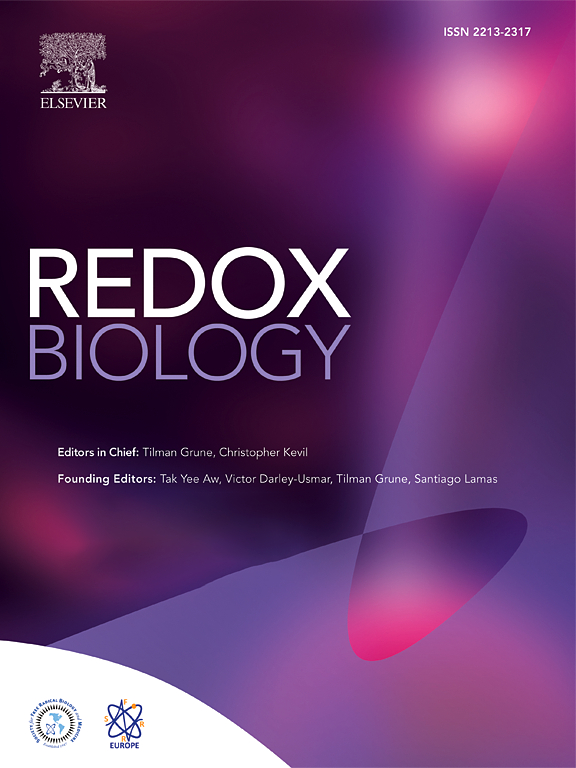Targeting catalase in cancer
IF 10.7
1区 生物学
Q1 BIOCHEMISTRY & MOLECULAR BIOLOGY
引用次数: 0
Abstract
Healthy cells have developed a sophisticated network of antioxidant molecules to prevent the toxic accumulation of reactive oxygen species (ROS) generated by diverse environmental stresses. On the opposite, cancer cells often exhibit high levels of ROS and an altered levels of antioxidant molecules compared to normal cells. Among them, the antioxidant enzyme catalase plays an essential role in cell defense against oxidative stress through the dismutation of hydrogen peroxide into water and molecular oxygen, and its expression is often decreased in cancer cells. The elevation of ROS in cancer cells provides them proliferative advantages, and leads to metabolic reprogramming, immune escape and metastasis. In this context, catalase is of critical importance to control these cellular processes in cancer through various mechanisms. In this review, we will discuss the major progresses and challenges in understanding the role of catalase in cancer for this last decade. This review also aims to provide important updates regarding the regulation of catalase expression, subcellular localization and discuss about the potential role of microbial catalases in tumor environment. Finally, we will describe the different catalase-based therapies and address the advantages, disadvantages, and limitations associated with modulating catalase therapeutically in cancer treatment.

癌症中的过氧化氢酶
健康细胞已经形成了一个复杂的抗氧化分子网络,以防止各种环境压力产生的活性氧(ROS)的毒性积累。相反,与正常细胞相比,癌细胞往往表现出高水平的 ROS 和抗氧化分子水平的改变。其中,抗氧化酶过氧化氢酶通过将过氧化氢分解成水和分子氧,在细胞防御氧化应激方面发挥着重要作用,而它在癌细胞中的表达量往往会下降。癌细胞中 ROS 的升高使其具有增殖优势,并导致新陈代谢重编程、免疫逃逸和转移。在这种情况下,过氧化氢酶对通过各种机制控制癌症中的这些细胞过程至关重要。在本综述中,我们将讨论近十年来在了解过氧化氢酶在癌症中的作用方面取得的主要进展和面临的挑战。本综述还旨在提供有关过氧化氢酶表达调控、亚细胞定位的最新重要信息,并讨论微生物过氧化氢酶在肿瘤环境中的潜在作用。最后,我们将介绍各种基于过氧化氢酶的疗法,并探讨在癌症治疗中调节过氧化氢酶疗法的优缺点和局限性。
本文章由计算机程序翻译,如有差异,请以英文原文为准。
求助全文
约1分钟内获得全文
求助全文
来源期刊

Redox Biology
BIOCHEMISTRY & MOLECULAR BIOLOGY-
CiteScore
19.90
自引率
3.50%
发文量
318
审稿时长
25 days
期刊介绍:
Redox Biology is the official journal of the Society for Redox Biology and Medicine and the Society for Free Radical Research-Europe. It is also affiliated with the International Society for Free Radical Research (SFRRI). This journal serves as a platform for publishing pioneering research, innovative methods, and comprehensive review articles in the field of redox biology, encompassing both health and disease.
Redox Biology welcomes various forms of contributions, including research articles (short or full communications), methods, mini-reviews, and commentaries. Through its diverse range of published content, Redox Biology aims to foster advancements and insights in the understanding of redox biology and its implications.
 求助内容:
求助内容: 应助结果提醒方式:
应助结果提醒方式:


